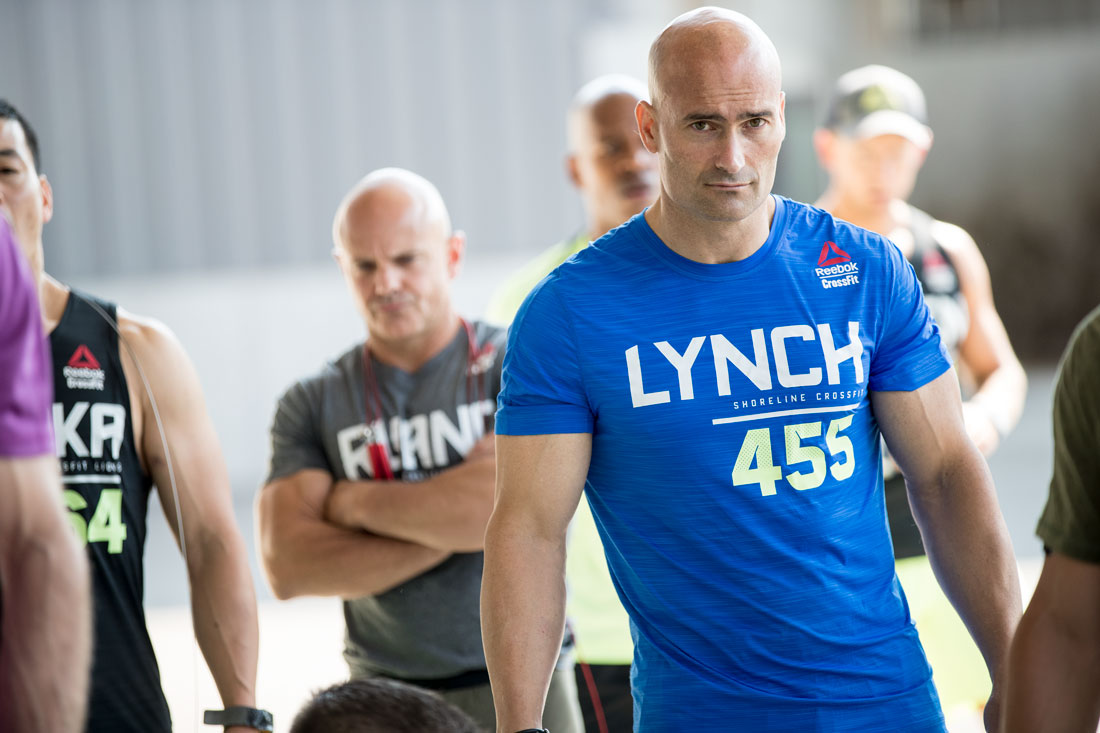It’s after midnight, and John Lynch is in the emergency room. One patient needs to be intubated. Another won’t stop bleeding. An ambulance carrying another patient is just minutes away.
In moments like these, Lynch draws on his CrossFit training.
“It’s really similar,” the 45-year-old masters athlete said after taking fifth in Vest Triplet Saturday afternoon. “It’s the same type of high-intensity environment, (expecting) the unexpected—and you know that sometimes you want to quit but you know you can’t; you just put your head down and you do it.”
Lynch, sixth in the Masters Men 45-49 Division after six events, is just one of dozens of CrossFit masters athletes juggling families and careers alongside their training. It’s a lifestyle that requires a delicate balance and unyielding commitment, said Masters Women 50-54 athlete Leka Fineman.
“I've had to put a lot of things on the back burner,” Fineman, in fifth at Saturday’s end, said. “I haven't seen any friends for a long time, my kids have been neglected ... even my poor dog is totally neglected.”

Whereas many younger athletes have the freedom to train when they please for however long they please, Fineman—who works full-time as a wardrobe stylist, often traveling for several days at a time—said balancing a career and an ambition to compete at the CrossFit Games means you have to make every minute count.
“You just really have to be efficient,” she said. “You can’t just go to the gym and hang out for five hours; you might only have an hour and you gotta get it done.”
To help stay on task, Fineman said she schedules her workouts “as if they were dentist appointments,” she said. “That time is non-negotiable.”
Sarah Franklin, a firefighter and S.W.A.T. team medic in Boynton Beach, Florida, agreed.
“When I get in there it’s go-time, there’s no dilly-dallying,” Franklin, fifth in the Masters Women 40-44 Division, said. “I get right to it and try to get a lot in in a short amount of time—and that probably helps me in competition, because I’m trying to put a lot (of work) into a little bit of time.”
Though Lynch, an emergency room physician at Middlesex Hospital in Middletown, Connecticut, typically works evenings, he rises at 6:30 a.m. each morning to get the day’s training in before heading to work, not only to stay in fighting shape for the CrossFit Games, but to set an example for his three teenage children.
“I want to set good examples by being fit (and) working hard, because they learn by example,” he said.
But sacrificing a lie-in in favor of fitness has other benefits as well. Lynch said training to be comfortable in the uncomfortable transfers to increased mental acuity when shit gets real in the ER.
“You feel like you're losing control real easily,” he said. “Just like during a hard workout, you just learn how to be mentally tough and pull it all together.”
Similarly, Jessica Aelvoet, 11th in the Masters Women 35-39 Division, relies on CrossFit to stay on top of her game in her job as a detective with the San Antonio Police Department in Texas, where she deals with everything from drug deals to shootings to street fights.
“You never know what's going to happen,” Aelvoet said. “There's a lot of bad things that go on in this world and you've got to be able to respond, (and) you're not gonna be able to respond based on your training that you did 10 years ago in a police academy if you don't keep up with it.”
Franklin could relate. Though she trains for the Games because she loves to compete, she said being physically fit is a job requirement for a spot on the S.W.A.T. team.
“They hold you to very high standards physically,” she said. “I’m the only female on the team—I literally have to do this to stay physical enough to keep up with them.”
Still, she says the side effects of her job requirements—elite fitness—are worth the sacrifices.
“This has been awesome,” she said of her first Games experience. “This is one of things I've just really wanted to be able to say I did, just to make it. It's surreal to be here.”
It’s the kind of feeling juggling jobs, families and elite-level training is worth.
“Absolutely it's worth it,” Aelvoet said at the end of the day. “Sometimes the days can be long and hard, but at the end of it all, it’s paying off.”




